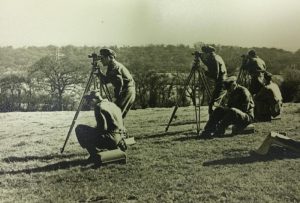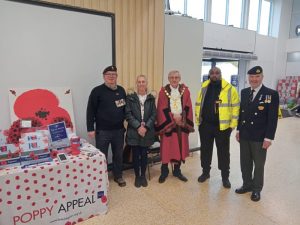Professional dog walkers say they were told “if you don’t like what we’re doing, take your dog somewhere else” at a public meeting about a new licensing scheme being introduced for several Surrey beauty spots.
Dog walkers have claimed the land managers are using the new licensing project as a ‘pay or go away scheme’ which they say it is more expensive than neighbouring schemes and has been “appallingly” managed.
New rules could see professional dog walkers pay £360 to use a Surrey beauty spot, Banstead Common, from April 1. Banstead Common Conservators (BCC) said the main reason for setting up the scheme was to ensure the safety of everyone who uses the Commons and to control commercial business on the land.
“There’s disdain for the profession and that’s been made very clear,” said Emma, a self-employed dog walker. She previously spoke to Local Democracy Reporting Service (LDRS) of the BCC staff being “heavy handed”. Now, Emma said the BCC are “bullying people into submission” with the new licensing rules.
Calling the land managers “prejudiced”, the professional dog walkers said the BCC have presented “no evidence” that they are a danger to the public or conservation compared to any other person who walks over the heath.
“They are refusing to supply the legal standing for the scheme,” said Emma, “I just don’t know what else to do.” Dog walkers have said they welcome the licensing scheme in principle but accused the BCC’s proposition as ‘unworkable’, more expensive than others and without engagement or input from dog walkers.
Rather than just a side-hustle, professional dog-walking is a job or business that people pay their mortgage with. Jen, a dog walker for nearly 10 years said: “The chairman and another committee member were dismissive and incredibly rude when concerned dog walkers asked legitimate questions about the licensing scheme at a January meeting.”
For months the professional dog walkers have complained they have been “left in the dark” and there has been “no dialogue” with the managers implementing a scheme which could significantly change their working conditions. “Their attitude has spurred so much misery and alienation,” an anonymous local dog walker said.
The chairman of the BCC accused professional dog walkers of “lying” in their complaints and “being insulting” against the BCC at a public meeting earlier this year. Another member advised dog walkers if they were not willing to pay for the license they should “go back to where they came from”.
A BCC spokesperson said: “All of our engagement with any user of Banstead Commons is done with respect and in accordance with our statutory duties.” The BCC have said they have responded to all enquiries they have received “in a professional and timely manner” and have hosted three informal meetings about the licensing scheme with positive feedback.
The land managers have said they are using their powers under paragraph 18 of the Metropolitan Commons Banstead (Supplemental) Act 1893 act to restrict commercial activity. Despite repeated requests from LDRS and interested groups, the conservators chose not to specifically highlight which part of the act they are referring to.
The BCC said the scheme was a response to the increase in the number of dogs being walked commercially on the Commons in recent years and the pressure it puts on the land, wildlife and visitors. As land managers, the conservators said, they need to ensure businesses are insured and identifiable when they are operating on our sites.
Spanning 1,350 acres, the land – owned by Reigate and Banstead Borough Council – includes Banstead Heath, Banstead Downs, Park Downs and Burgh Heath. Although the BCC claim the £360 annual license fee offers a good deal for users at just less than £1 a day, professional dog walkers argue it is extortionate compared to other Surrey and London boroughs which are council-run.
Similar schemes are also being trialled elsewhere in Surrey. Nonsuch Park in Epsom, is running a pilot commercial dog licensing fee of £200 a year with a limit of six dogs walking at any one time. The licence will be managed by Epsom and Ewell Borough Council as well as the London Borough of Sutton Council. Charging £164.50 to use open spaces across the whole district, Tandridge District Council also runs a licensing scheme.
Although some dog walkers may call the response “overblown”, the BCC said it has clear legal responsibilities to “protect the integrity of Banstead Commons and visitor safety”. The group added it has also catered its response in line with a prevention of future deaths report for Natasha Johnston, a professional dog walker who tragically was mauled to death by eight dogs she was walking in Caterham in 2023.
“Unknown people shouldn’t approach unknown dogs,” said Jen. She said the part of the scheme she was most concerned about was BCC staff being able to walk up to her and the dogs and check collars which could put the dogs and herself at risk. “It goes completely against my GDPR policy,” Jen said.
As it stands, if a dog walker’s license is revoked there is no process of appeal and no refund. “They are judge, jury and executioner,” Jen said. She lamented that neither Reigate and Banstead Borough Council, the landowners, nor the Department for Environmental Food and Rural Affairs want to get involved and the BCC are “unaccountable”.
“What’s different between dog walkers and members of the public walking dogs?” the anonymous dog walker challenged, explaining everyone uses the land and has to pick up dog poo. Speaking to the LDRS, the dog walkers said they take out local community dogs that live in the area and provide a needed service.
A BCC spokesperson said: “Banstead Commons Conservators are looking forward to working together with licensed dog walkers operating on our Commons. We have set up clear reporting procedures with licensed businesses which as well as a direct staff member to report concerns, includes hosting an annual review meeting open to all licensed businesses and an invitation for two representatives to join our Banstead Commons Consultative Group.
“Banstead Commons are wonderful open spaces enjoyed by many residents and visitors from further afield. Under our Act commercial activity is controlled in order to protect the integrity of the Commons and the welfare of its users. With the increasing volume of professional dog walkers, including displacement from other areas that have already implemented restrictions, it has become necessary to take the responsible step of licensing this activity. This scheme will help regulate the numbers of dogs being walked commercially on our sites and ensure that companies are operating safely and treating Banstead Commons, its users and wildlife with respect and consideration.
“Unless there is an incident to manage, Banstead Commons Conservators will not be interfering with licensed dog walking companies when they are operating safely and adhering to the licence scheme […] Banstead Commons Conservators are always compliant in their operations.”
Related reports:
A dog’s dinner of a licensing scheme?
Should Nonsuch Park go to the dogs?
Image: Four dogs in Banstead wood, ahead of the licensing scheme to be introduced. (Credit: Dog walker Emma)











